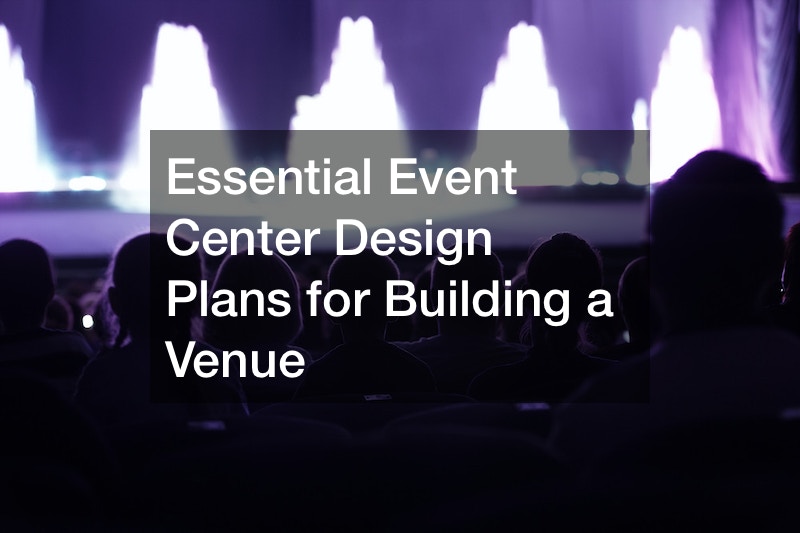
Event center design plans are a crucial aspect of building a successful venue that meets the needs of both event organizers and attendees. From the flooring to the roofing, every element of the design must be carefully considered to ensure that the event center is functional, visually appealing, and able to accommodate a large number of people. In this article, we will delve into the essential elements of event center design plans, including flooring, heating and air conditioning, brush clearing, commercial glass, entry door glass insert, generators, roofing, and interior staircases. By understanding the importance of each of these elements, we can create a venue that is sure to impress. In this article, we will delve into the essential elements of event center design plans, including flooring, heating and air conditioning, brush clearing, commercial glass, entry door glass insert, generators, roofing, and interior staircases. By understanding the importance of each of these elements, we can create a venue that is sure to impress.
1. Flooring

Flooring is one of the most important aspects of an event center’s design plans. It not only needs to be durable enough to withstand heavy foot traffic but also needs to be visually appealing. There are several options to choose from, such as carpet, tile, and hardwood. Carpet is a popular choice for event centers as it provides a warm and inviting atmosphere. Tile is another option that is durable and easy to clean, making it a great choice for high-traffic areas. Hardwood is a more expensive option, but it adds a touch of elegance to the space. A flooring service can provide professional installation and maintenance of these options. In addition, if the event center will host events with a high level of foot traffic, it is recommended to use a more durable option such as tile or hardwood.
2. Heating and Air Conditioning
Another important aspect of event center design plans is the heating and air conditioning systems. The venue needs to be able to accommodate a large number of people and maintain a comfortable temperature throughout the event. This means that the heating and air conditioning systems need to be designed to handle the capacity of the event center. A heating service can provide professional installation and maintenance of these systems. It is also important to consider the possible different events that will be held in the center and the temperature requirements for each event.
3. Brush Clearing

The event center’s exterior design plans also need to be taken into consideration. This includes brush clearing, which is the process of removing any overgrown vegetation or debris from the property. This is important for both aesthetic and safety reasons. A clear and well-maintained exterior can make a positive first impression on attendees and also ensures that the property is safe for guests to walk around. It is also important to have a proper lighting system for the exterior, to ensure the safety of the guests during the night events.
4. Commercial Glass
Commercial glass is another important aspect of exterior design plans. This includes the use of large glass windows and doors that allow natural light to enter the venue. This not only enhances the visual appeal of the event center but also helps to save on energy costs. Aluminum frames are a popular choice for commercial glass as they are durable and require minimal maintenance. The use of commercial glass also allows for the incorporation of natural light into the event center, creating a more inviting and open atmosphere.
5. Entry Door Glass Inserts

The entry door is the first thing that guests will see when they arrive at the event center. Therefore, it is important to have a visually appealing entry door. Entry door glass inserts can be a great way to add a touch of elegance to the space. These inserts can be customized to match the design of the event center and can be installed by a professional. The use of glass insert doors also allows for more natural light to enter the event center, creating a brighter and more inviting atmosphere.
6. Generators
Power is an essential element of any event center. This includes having backup generators in case of a power outage. This ensures that the event can continue without interruption and that the safety of guests is not compromised. Generators can be installed by a professional and regularly maintained to ensure they are in proper working order. It is important to have a reliable power source and backup generators to ensure that the events can be held without interruption even in the case of power outages.
7. Roofing

The roof of an event center is an important aspect of the design plans as it protects the venue from the elements. It is important to choose a durable and weather-resistant roofing material. There are several options to choose from, such as metal, asphalt, and tile. A roofer can provide professional installation and maintenance of these options. The roofing material should also be insulated to keep the event center at a comfortable temperature. It is important to have a well-insulated roof to help keep the temperature inside the event center consistent and comfortable for guests.
8. Interior Staircases
Interior staircases are an essential element of event center design plans. They not only provide a functional way for guests to move between levels of the venue but also serve as an important design feature. Interior staircases can be made of wood, steel, or concrete, and can be customized to match the design of the event center. It is important to have a staircase that is safe and easy to use, with proper handrails and lighting. Interior staircases can also be used to create a sense of grandeur and to make a statement in the event center.
9. Lighting
Lighting is an essential aspect of event center design plans. It not only provides visibility for guests but also sets the mood and atmosphere of the event. There are several types of lighting to choose from, including ambient, task, and accent lighting. Ambient lighting provides overall illumination for the event center, task lighting is used for specific activities such as reading or working, and accent lighting is used to highlight specific features of the event center such as artwork or architectural elements. It is important to have a lighting system that is flexible and can be easily adjusted to suit the needs of different events. A professional lighting designer can help to create a lighting plan that meets the specific needs of the event center.
10. Sound Systems
Sound systems are an essential aspect of event center design plans, as they play a crucial role in ensuring that guests can hear the speakers and performers clearly. There are several types of sound systems to choose from, including wired and wireless systems. Wired systems are more reliable but can be more difficult to install and maintain, while wireless systems are easier to install but can be more prone to interference. It is important to have a sound system that is powerful enough to fill the event center and that can be easily adjusted to suit the needs of different events. A professional audio engineer can help to design a sound system that meets the specific needs of the event center.
11. Seating
Seating is an essential aspect of event center design plans. It not only provides a place for guests to sit but also plays a crucial role in the overall design of the event center. There are several types of seating to choose from, including theater seating, banquet seating, and lounge seating. Theater seating is best for events where guests will be sitting for long periods of time and need to be able to see the stage clearly. Banquet seating is best for events where guests will be seated at tables, such as weddings or formal dinners. Lounge seating is best for events where guests will be standing or moving around, such as cocktail parties. A professional seating designer can help to create a seating plan that meets the specific needs of the event center.
12. Food
Food and beverage services are an essential aspect of event center design plans. They not only provide sustenance for guests but also play a crucial role in the overall experience of the event. There are several options for food and beverage services, including on-site catering, food trucks, and outside vendors. On-site catering is the most convenient option as it allows for easy coordination with the event center staff. Food trucks and outside vendors can add a unique and memorable element to the event, but they may require additional coordination and permits. It is important to have a food and beverage service plan that meets the specific needs of the event center and can accommodate a large number of guests.
Event centers are a vital part of the entertainment and event industry. They provide a space for various events such as concerts, conventions, conferences, and more. The design of an event center plays a critical role in its success, as it can attract more events, create a memorable experience for guests, and generate more revenue. Therefore, event center design plans should be well-thought-out, detailed, and executed by experts in the field.
Another important aspect of event center design plans is the incorporation of technology. This includes the use of digital signage, interactive kiosks, and mobile apps. These technologies can enhance the guest experience by providing them with real-time information, directions, and even virtual tours of the event center. They can also improve the efficiency of event center operations by reducing the need for printed materials and manual processes.
Event center design plans should also include a solid marketing strategy. This includes the development of a strong brand identity and the creation of a website and social media presence. A solid marketing strategy can help to attract more events and guests to the event center. Additionally, it can help to increase revenue by promoting the event center’s services, such as catering, audio-visual equipment rental, and event planning services.
In addition, it’s also important to consider the location and accessibility of the event center. A location that is easily accessible by public transportation or major highways can make it more convenient for guests to attend events. Additionally, being located in a popular area with nearby dining and shopping options can also make the event center more attractive to guests.
Another important aspect of event center design plans is the use of flexible spaces. This includes the ability to divide large spaces into smaller ones, as well as the use of modular furniture and temporary walls. This allows the event center to accommodate a variety of events, from small intimate gatherings to large-scale conventions and also enables the event center to be easily reconfigured to suit the needs of each event.
Lastly, the event center design plans should also include a plan for the management and maintenance of the facility. This includes the development of standard operating procedures, the hiring of dedicated staff, and the creation of a maintenance schedule to ensure that the event center is always in top condition. This can also help to prolong the life of the facility and reduce the need for costly repairs in the future.
In conclusion, event center design plans are a crucial aspect of building a successful venue. From the flooring to the food and beverage services, every element of the design must be carefully considered to ensure that the event center is functional, visually appealing, and able to accommodate a large number of people. By understanding the importance of each of these elements, including flooring, heating services, and air conditioning, brush clearing, roofers, commercial glass, entry door glass insert, generators, roofing, interior staircases, lighting, sound systems, seating, and food and beverage services, we can create a venue that is sure to impress. With careful planning and attention to detail, an event center can be designed to meet the needs of both event organizers and attendees.


